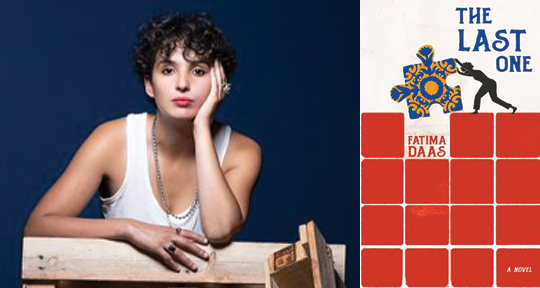The Last One by Fatima Daas, translated from the French by Lara Vergnaud, Other Press, 2021
Of the human world, love is both conflict and destination. Our understanding of love—what it is, how to do it—is immensely varied, and its dominating presence rules our formative years. To be deprived of, or shamed from, an open expression of love can be a numbing experience, one that rearranges the nucleus of our social interactions and emotional familiarities into a sinister puzzle. Still, no matter in estrangement or intimacy, our lives revolve around our need, or lack thereof, for closeness; the life of The Last One’s narrator, Fatima, is no different. For Fatima, the precariousness of love applies to her human relationships, but are further compared and contrasted with the relationship she nurtures with God.
The novel, comprised of vignettes and fragmented memories, is coalesced by Fatima’s attempt to comprehend, or perhaps mend, the conflicting multiplicity of her self—queer, Muslim, Algerian-French, woman. Each scene opens in a diary-like manner: “My name is Fatima,” followed by a personal fact—sometimes trivial, such as the consequence of her naming or her like/dislike for commuting—and other times, a profound reflective statement: “I regret that no one taught me how to love”. The entire book charts her pilgrimage of probing about in the study of love, of creating and maintaining meaningful and intimate relationships with other people, with God, or with herself. All of this is interlaced with disparate interpretations of cultures and languages, often governed by paternalistic attitudes.
From the beginning, we learn the precious nature of her name—that it “mustn’t be soiled,” or “wassekh”: to “soil, stir shit up, blacken.” The origin and meaning of her name is sacred, derived from the Prophet Muhammad’s beloved daughter Fatima—which means “little weaned she-camel.” She analyses the different definitions of “fatm”—the Arabic for “to wean”—compiling all three in the same paragraph as if to correlate them with one another: “Stop the nursing of a child or a young animal to transition it to a new mode of feeding; feel frustration; separate someone from something or something from someone or someone from someone.” In the same scene, she compares and contrasts her strained familial circumstances with the other Fatima’s:
Like Fatima, I should have had three sisters. […]
Fatima’s father deems her the noblest woman in heaven.
The prophet Mohammed—may God’s peace and blessings be upon him—said one day: “Fatima is a part of me. Any who harm her harm me.”
My father would never say such a thing.
My father doesn’t say much to me anymore. READ MORE…

